Analyzing Leadership, Management, and Operations at Marks & Spencer
VerifiedAdded on 2020/12/10
|14
|5085
|64
Report
AI Summary
This report provides a comprehensive analysis of leadership and operations management within Marks & Spencer, a British multinational retailer. It begins by differentiating between leaders and managers, outlining their respective roles and responsibilities within the organization. The report then delves into the functions of managers, providing examples of decision-making processes, handling employee resistance, and applying Fayol's management functions. Furthermore, it explores various leadership styles, including situational, system, and contingency leadership, and their practical applications within Marks & Spencer. The report also examines the different approaches to operations management, the role of store managers, the importance of operations management in retail, and the impact of external factors on decision-making. Overall, the analysis highlights the interplay between leadership, management, and operations in achieving organizational goals and enhancing productivity at Marks & Spencer.
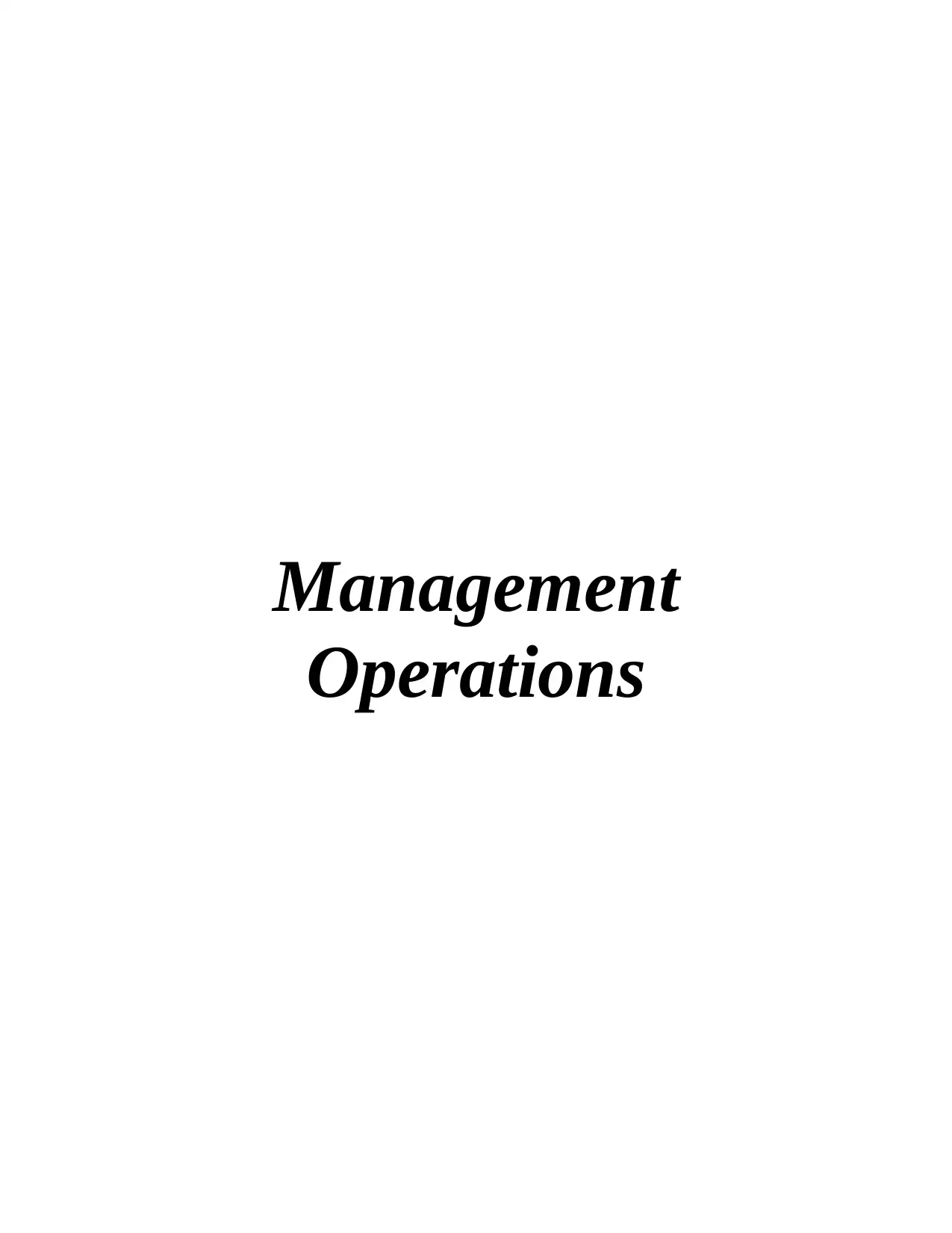
Management
Operations
Operations
Paraphrase This Document
Need a fresh take? Get an instant paraphrase of this document with our AI Paraphraser
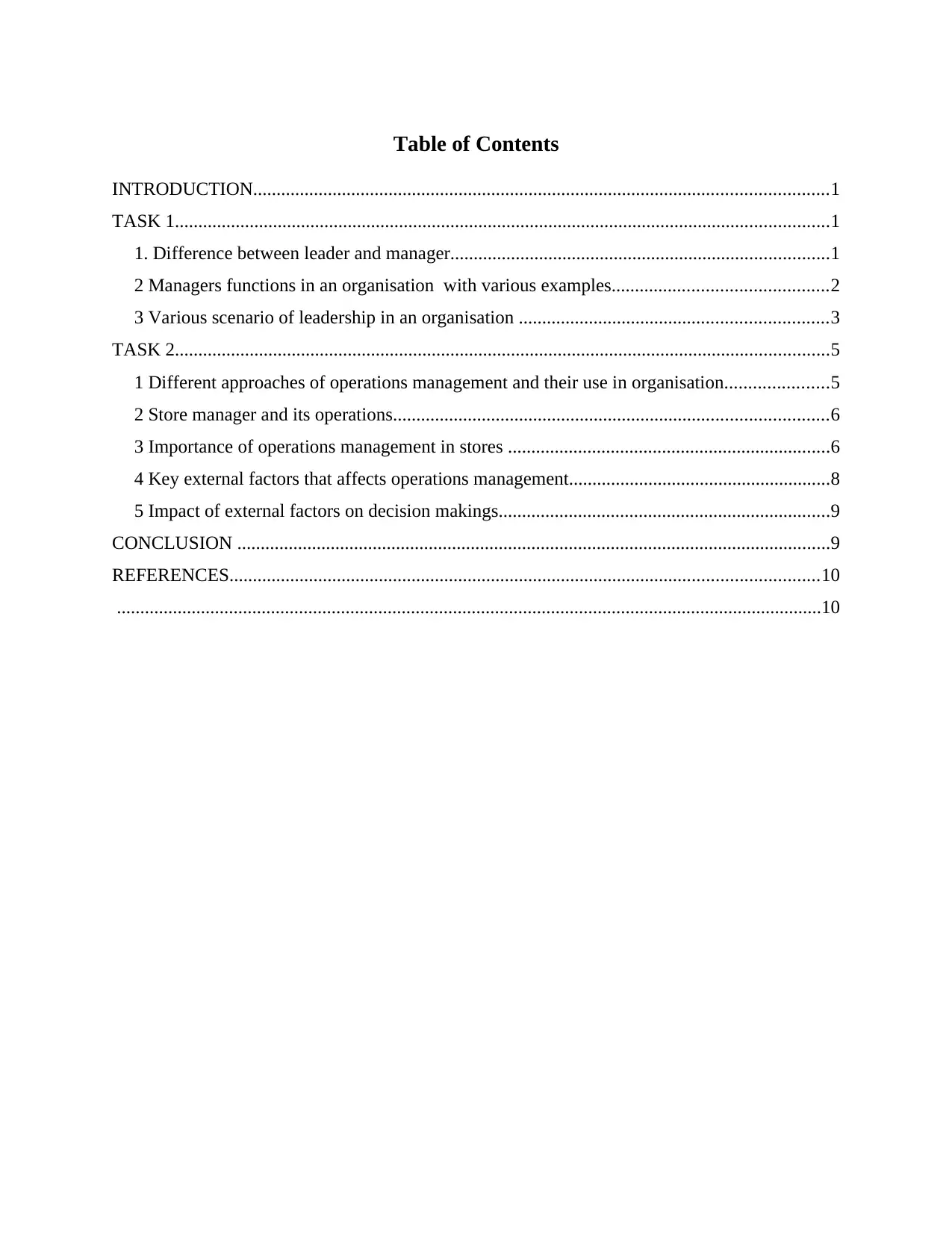
Table of Contents
INTRODUCTION...........................................................................................................................1
TASK 1............................................................................................................................................1
1. Difference between leader and manager.................................................................................1
2 Managers functions in an organisation with various examples..............................................2
3 Various scenario of leadership in an organisation ..................................................................3
TASK 2............................................................................................................................................5
1 Different approaches of operations management and their use in organisation......................5
2 Store manager and its operations.............................................................................................6
3 Importance of operations management in stores .....................................................................6
4 Key external factors that affects operations management........................................................8
5 Impact of external factors on decision makings.......................................................................9
CONCLUSION ...............................................................................................................................9
REFERENCES..............................................................................................................................10
.......................................................................................................................................................10
INTRODUCTION...........................................................................................................................1
TASK 1............................................................................................................................................1
1. Difference between leader and manager.................................................................................1
2 Managers functions in an organisation with various examples..............................................2
3 Various scenario of leadership in an organisation ..................................................................3
TASK 2............................................................................................................................................5
1 Different approaches of operations management and their use in organisation......................5
2 Store manager and its operations.............................................................................................6
3 Importance of operations management in stores .....................................................................6
4 Key external factors that affects operations management........................................................8
5 Impact of external factors on decision makings.......................................................................9
CONCLUSION ...............................................................................................................................9
REFERENCES..............................................................................................................................10
.......................................................................................................................................................10
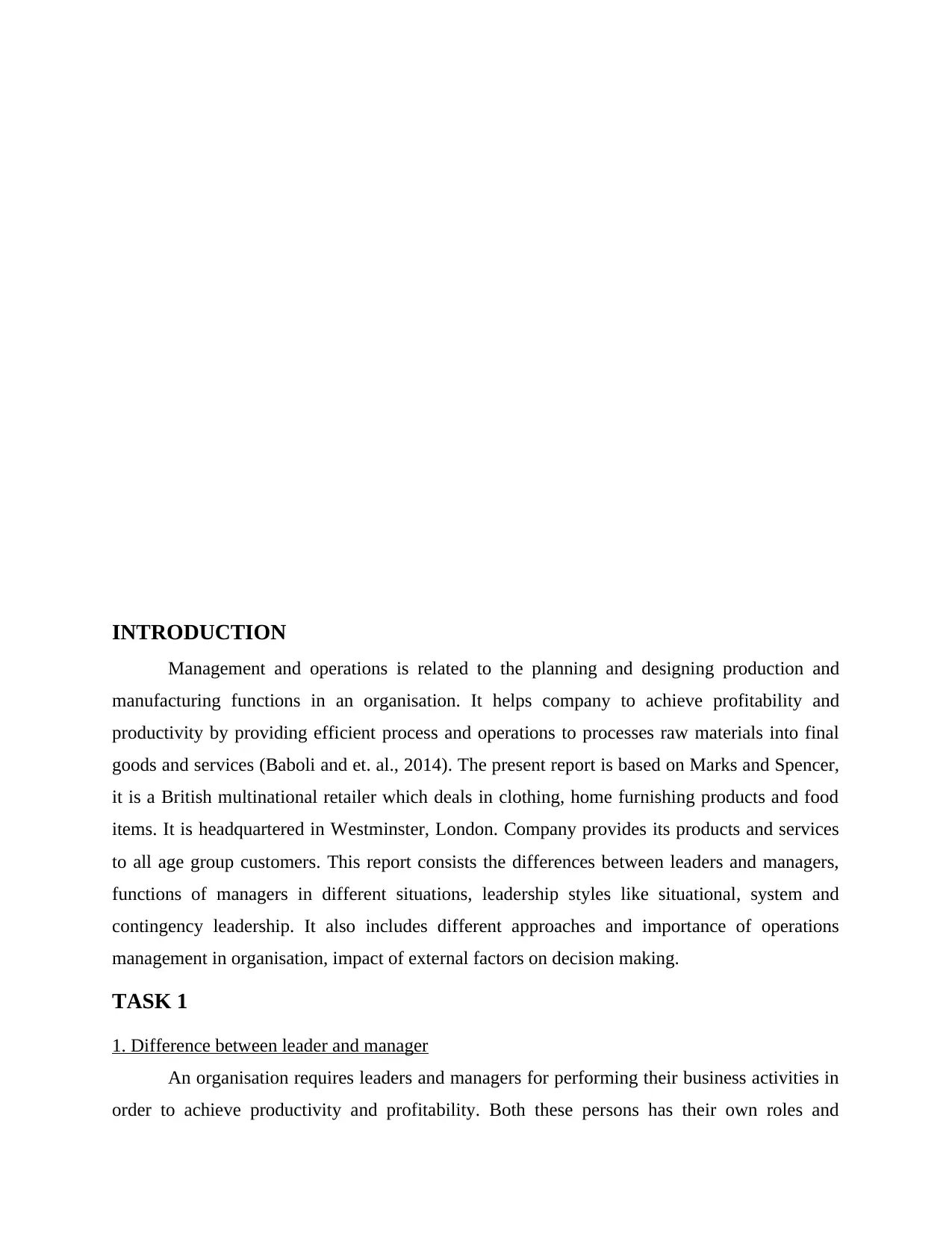
INTRODUCTION
Management and operations is related to the planning and designing production and
manufacturing functions in an organisation. It helps company to achieve profitability and
productivity by providing efficient process and operations to processes raw materials into final
goods and services (Baboli and et. al., 2014). The present report is based on Marks and Spencer,
it is a British multinational retailer which deals in clothing, home furnishing products and food
items. It is headquartered in Westminster, London. Company provides its products and services
to all age group customers. This report consists the differences between leaders and managers,
functions of managers in different situations, leadership styles like situational, system and
contingency leadership. It also includes different approaches and importance of operations
management in organisation, impact of external factors on decision making.
TASK 1
1. Difference between leader and manager
An organisation requires leaders and managers for performing their business activities in
order to achieve productivity and profitability. Both these persons has their own roles and
Management and operations is related to the planning and designing production and
manufacturing functions in an organisation. It helps company to achieve profitability and
productivity by providing efficient process and operations to processes raw materials into final
goods and services (Baboli and et. al., 2014). The present report is based on Marks and Spencer,
it is a British multinational retailer which deals in clothing, home furnishing products and food
items. It is headquartered in Westminster, London. Company provides its products and services
to all age group customers. This report consists the differences between leaders and managers,
functions of managers in different situations, leadership styles like situational, system and
contingency leadership. It also includes different approaches and importance of operations
management in organisation, impact of external factors on decision making.
TASK 1
1. Difference between leader and manager
An organisation requires leaders and managers for performing their business activities in
order to achieve productivity and profitability. Both these persons has their own roles and
⊘ This is a preview!⊘
Do you want full access?
Subscribe today to unlock all pages.

Trusted by 1+ million students worldwide
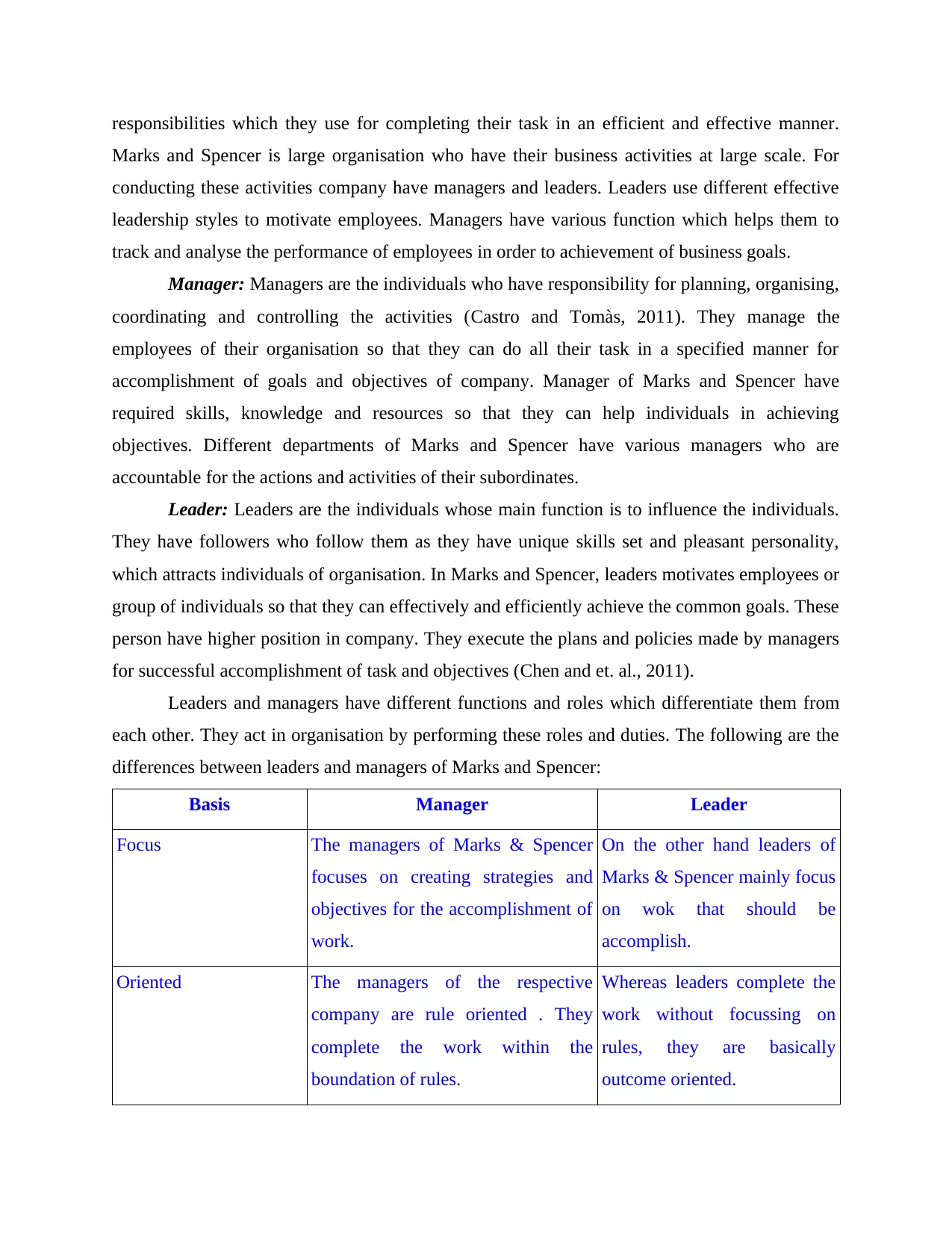
responsibilities which they use for completing their task in an efficient and effective manner.
Marks and Spencer is large organisation who have their business activities at large scale. For
conducting these activities company have managers and leaders. Leaders use different effective
leadership styles to motivate employees. Managers have various function which helps them to
track and analyse the performance of employees in order to achievement of business goals.
Manager: Managers are the individuals who have responsibility for planning, organising,
coordinating and controlling the activities (Castro and Tomàs, 2011). They manage the
employees of their organisation so that they can do all their task in a specified manner for
accomplishment of goals and objectives of company. Manager of Marks and Spencer have
required skills, knowledge and resources so that they can help individuals in achieving
objectives. Different departments of Marks and Spencer have various managers who are
accountable for the actions and activities of their subordinates.
Leader: Leaders are the individuals whose main function is to influence the individuals.
They have followers who follow them as they have unique skills set and pleasant personality,
which attracts individuals of organisation. In Marks and Spencer, leaders motivates employees or
group of individuals so that they can effectively and efficiently achieve the common goals. These
person have higher position in company. They execute the plans and policies made by managers
for successful accomplishment of task and objectives (Chen and et. al., 2011).
Leaders and managers have different functions and roles which differentiate them from
each other. They act in organisation by performing these roles and duties. The following are the
differences between leaders and managers of Marks and Spencer:
Basis Manager Leader
Focus The managers of Marks & Spencer
focuses on creating strategies and
objectives for the accomplishment of
work.
On the other hand leaders of
Marks & Spencer mainly focus
on wok that should be
accomplish.
Oriented The managers of the respective
company are rule oriented . They
complete the work within the
boundation of rules.
Whereas leaders complete the
work without focussing on
rules, they are basically
outcome oriented.
Marks and Spencer is large organisation who have their business activities at large scale. For
conducting these activities company have managers and leaders. Leaders use different effective
leadership styles to motivate employees. Managers have various function which helps them to
track and analyse the performance of employees in order to achievement of business goals.
Manager: Managers are the individuals who have responsibility for planning, organising,
coordinating and controlling the activities (Castro and Tomàs, 2011). They manage the
employees of their organisation so that they can do all their task in a specified manner for
accomplishment of goals and objectives of company. Manager of Marks and Spencer have
required skills, knowledge and resources so that they can help individuals in achieving
objectives. Different departments of Marks and Spencer have various managers who are
accountable for the actions and activities of their subordinates.
Leader: Leaders are the individuals whose main function is to influence the individuals.
They have followers who follow them as they have unique skills set and pleasant personality,
which attracts individuals of organisation. In Marks and Spencer, leaders motivates employees or
group of individuals so that they can effectively and efficiently achieve the common goals. These
person have higher position in company. They execute the plans and policies made by managers
for successful accomplishment of task and objectives (Chen and et. al., 2011).
Leaders and managers have different functions and roles which differentiate them from
each other. They act in organisation by performing these roles and duties. The following are the
differences between leaders and managers of Marks and Spencer:
Basis Manager Leader
Focus The managers of Marks & Spencer
focuses on creating strategies and
objectives for the accomplishment of
work.
On the other hand leaders of
Marks & Spencer mainly focus
on wok that should be
accomplish.
Oriented The managers of the respective
company are rule oriented . They
complete the work within the
boundation of rules.
Whereas leaders complete the
work without focussing on
rules, they are basically
outcome oriented.
Paraphrase This Document
Need a fresh take? Get an instant paraphrase of this document with our AI Paraphraser
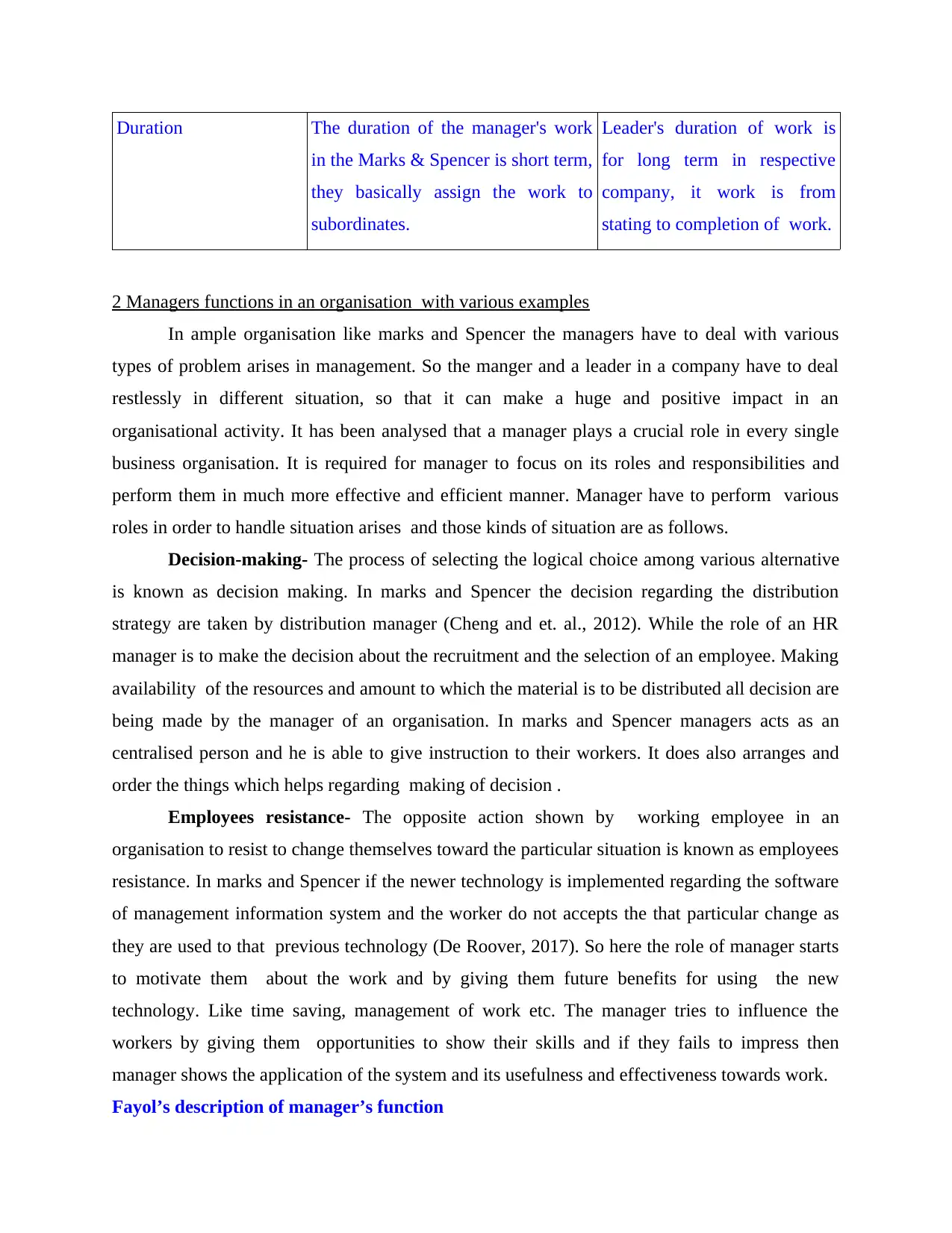
Duration The duration of the manager's work
in the Marks & Spencer is short term,
they basically assign the work to
subordinates.
Leader's duration of work is
for long term in respective
company, it work is from
stating to completion of work.
2 Managers functions in an organisation with various examples
In ample organisation like marks and Spencer the managers have to deal with various
types of problem arises in management. So the manger and a leader in a company have to deal
restlessly in different situation, so that it can make a huge and positive impact in an
organisational activity. It has been analysed that a manager plays a crucial role in every single
business organisation. It is required for manager to focus on its roles and responsibilities and
perform them in much more effective and efficient manner. Manager have to perform various
roles in order to handle situation arises and those kinds of situation are as follows.
Decision-making- The process of selecting the logical choice among various alternative
is known as decision making. In marks and Spencer the decision regarding the distribution
strategy are taken by distribution manager (Cheng and et. al., 2012). While the role of an HR
manager is to make the decision about the recruitment and the selection of an employee. Making
availability of the resources and amount to which the material is to be distributed all decision are
being made by the manager of an organisation. In marks and Spencer managers acts as an
centralised person and he is able to give instruction to their workers. It does also arranges and
order the things which helps regarding making of decision .
Employees resistance- The opposite action shown by working employee in an
organisation to resist to change themselves toward the particular situation is known as employees
resistance. In marks and Spencer if the newer technology is implemented regarding the software
of management information system and the worker do not accepts the that particular change as
they are used to that previous technology (De Roover, 2017). So here the role of manager starts
to motivate them about the work and by giving them future benefits for using the new
technology. Like time saving, management of work etc. The manager tries to influence the
workers by giving them opportunities to show their skills and if they fails to impress then
manager shows the application of the system and its usefulness and effectiveness towards work.
Fayol’s description of manager’s function
in the Marks & Spencer is short term,
they basically assign the work to
subordinates.
Leader's duration of work is
for long term in respective
company, it work is from
stating to completion of work.
2 Managers functions in an organisation with various examples
In ample organisation like marks and Spencer the managers have to deal with various
types of problem arises in management. So the manger and a leader in a company have to deal
restlessly in different situation, so that it can make a huge and positive impact in an
organisational activity. It has been analysed that a manager plays a crucial role in every single
business organisation. It is required for manager to focus on its roles and responsibilities and
perform them in much more effective and efficient manner. Manager have to perform various
roles in order to handle situation arises and those kinds of situation are as follows.
Decision-making- The process of selecting the logical choice among various alternative
is known as decision making. In marks and Spencer the decision regarding the distribution
strategy are taken by distribution manager (Cheng and et. al., 2012). While the role of an HR
manager is to make the decision about the recruitment and the selection of an employee. Making
availability of the resources and amount to which the material is to be distributed all decision are
being made by the manager of an organisation. In marks and Spencer managers acts as an
centralised person and he is able to give instruction to their workers. It does also arranges and
order the things which helps regarding making of decision .
Employees resistance- The opposite action shown by working employee in an
organisation to resist to change themselves toward the particular situation is known as employees
resistance. In marks and Spencer if the newer technology is implemented regarding the software
of management information system and the worker do not accepts the that particular change as
they are used to that previous technology (De Roover, 2017). So here the role of manager starts
to motivate them about the work and by giving them future benefits for using the new
technology. Like time saving, management of work etc. The manager tries to influence the
workers by giving them opportunities to show their skills and if they fails to impress then
manager shows the application of the system and its usefulness and effectiveness towards work.
Fayol’s description of manager’s function
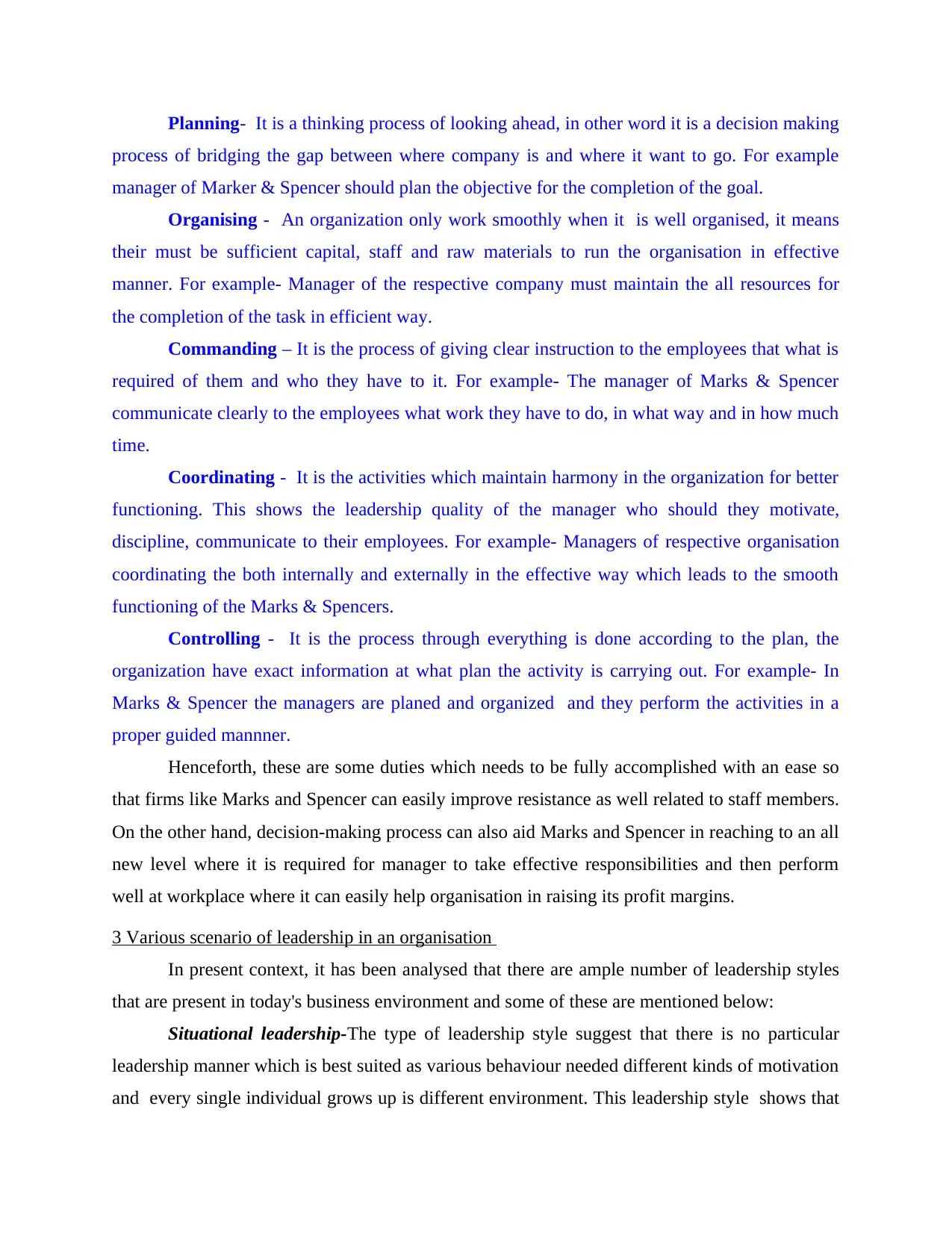
Planning- It is a thinking process of looking ahead, in other word it is a decision making
process of bridging the gap between where company is and where it want to go. For example
manager of Marker & Spencer should plan the objective for the completion of the goal.
Organising - An organization only work smoothly when it is well organised, it means
their must be sufficient capital, staff and raw materials to run the organisation in effective
manner. For example- Manager of the respective company must maintain the all resources for
the completion of the task in efficient way.
Commanding – It is the process of giving clear instruction to the employees that what is
required of them and who they have to it. For example- The manager of Marks & Spencer
communicate clearly to the employees what work they have to do, in what way and in how much
time.
Coordinating - It is the activities which maintain harmony in the organization for better
functioning. This shows the leadership quality of the manager who should they motivate,
discipline, communicate to their employees. For example- Managers of respective organisation
coordinating the both internally and externally in the effective way which leads to the smooth
functioning of the Marks & Spencers.
Controlling - It is the process through everything is done according to the plan, the
organization have exact information at what plan the activity is carrying out. For example- In
Marks & Spencer the managers are planed and organized and they perform the activities in a
proper guided mannner.
Henceforth, these are some duties which needs to be fully accomplished with an ease so
that firms like Marks and Spencer can easily improve resistance as well related to staff members.
On the other hand, decision-making process can also aid Marks and Spencer in reaching to an all
new level where it is required for manager to take effective responsibilities and then perform
well at workplace where it can easily help organisation in raising its profit margins.
3 Various scenario of leadership in an organisation
In present context, it has been analysed that there are ample number of leadership styles
that are present in today's business environment and some of these are mentioned below:
Situational leadership-The type of leadership style suggest that there is no particular
leadership manner which is best suited as various behaviour needed different kinds of motivation
and every single individual grows up is different environment. This leadership style shows that
process of bridging the gap between where company is and where it want to go. For example
manager of Marker & Spencer should plan the objective for the completion of the goal.
Organising - An organization only work smoothly when it is well organised, it means
their must be sufficient capital, staff and raw materials to run the organisation in effective
manner. For example- Manager of the respective company must maintain the all resources for
the completion of the task in efficient way.
Commanding – It is the process of giving clear instruction to the employees that what is
required of them and who they have to it. For example- The manager of Marks & Spencer
communicate clearly to the employees what work they have to do, in what way and in how much
time.
Coordinating - It is the activities which maintain harmony in the organization for better
functioning. This shows the leadership quality of the manager who should they motivate,
discipline, communicate to their employees. For example- Managers of respective organisation
coordinating the both internally and externally in the effective way which leads to the smooth
functioning of the Marks & Spencers.
Controlling - It is the process through everything is done according to the plan, the
organization have exact information at what plan the activity is carrying out. For example- In
Marks & Spencer the managers are planed and organized and they perform the activities in a
proper guided mannner.
Henceforth, these are some duties which needs to be fully accomplished with an ease so
that firms like Marks and Spencer can easily improve resistance as well related to staff members.
On the other hand, decision-making process can also aid Marks and Spencer in reaching to an all
new level where it is required for manager to take effective responsibilities and then perform
well at workplace where it can easily help organisation in raising its profit margins.
3 Various scenario of leadership in an organisation
In present context, it has been analysed that there are ample number of leadership styles
that are present in today's business environment and some of these are mentioned below:
Situational leadership-The type of leadership style suggest that there is no particular
leadership manner which is best suited as various behaviour needed different kinds of motivation
and every single individual grows up is different environment. This leadership style shows that
⊘ This is a preview!⊘
Do you want full access?
Subscribe today to unlock all pages.

Trusted by 1+ million students worldwide
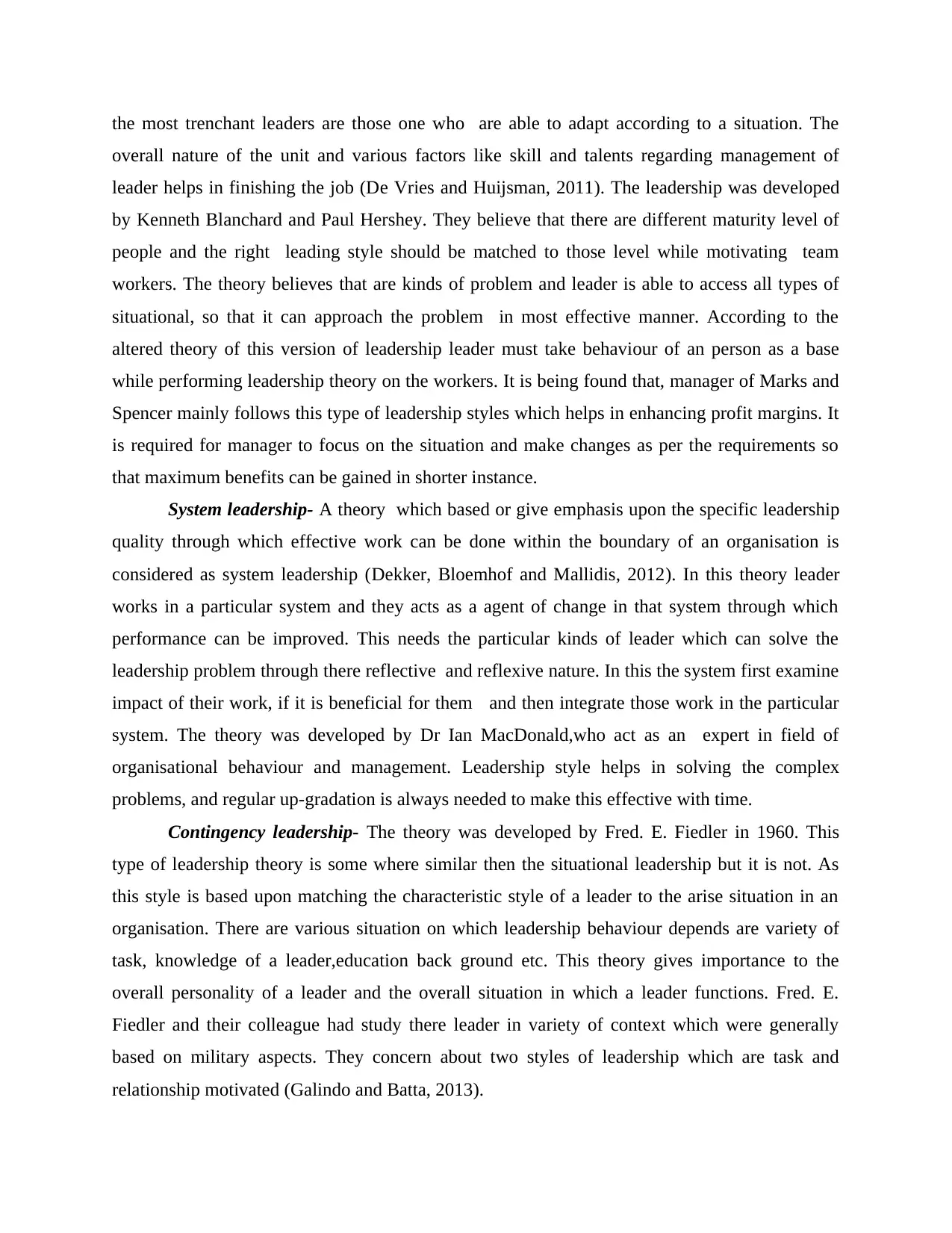
the most trenchant leaders are those one who are able to adapt according to a situation. The
overall nature of the unit and various factors like skill and talents regarding management of
leader helps in finishing the job (De Vries and Huijsman, 2011). The leadership was developed
by Kenneth Blanchard and Paul Hershey. They believe that there are different maturity level of
people and the right leading style should be matched to those level while motivating team
workers. The theory believes that are kinds of problem and leader is able to access all types of
situational, so that it can approach the problem in most effective manner. According to the
altered theory of this version of leadership leader must take behaviour of an person as a base
while performing leadership theory on the workers. It is being found that, manager of Marks and
Spencer mainly follows this type of leadership styles which helps in enhancing profit margins. It
is required for manager to focus on the situation and make changes as per the requirements so
that maximum benefits can be gained in shorter instance.
System leadership- A theory which based or give emphasis upon the specific leadership
quality through which effective work can be done within the boundary of an organisation is
considered as system leadership (Dekker, Bloemhof and Mallidis, 2012). In this theory leader
works in a particular system and they acts as a agent of change in that system through which
performance can be improved. This needs the particular kinds of leader which can solve the
leadership problem through there reflective and reflexive nature. In this the system first examine
impact of their work, if it is beneficial for them and then integrate those work in the particular
system. The theory was developed by Dr Ian MacDonald,who act as an expert in field of
organisational behaviour and management. Leadership style helps in solving the complex
problems, and regular up-gradation is always needed to make this effective with time.
Contingency leadership- The theory was developed by Fred. E. Fiedler in 1960. This
type of leadership theory is some where similar then the situational leadership but it is not. As
this style is based upon matching the characteristic style of a leader to the arise situation in an
organisation. There are various situation on which leadership behaviour depends are variety of
task, knowledge of a leader,education back ground etc. This theory gives importance to the
overall personality of a leader and the overall situation in which a leader functions. Fred. E.
Fiedler and their colleague had study there leader in variety of context which were generally
based on military aspects. They concern about two styles of leadership which are task and
relationship motivated (Galindo and Batta, 2013).
overall nature of the unit and various factors like skill and talents regarding management of
leader helps in finishing the job (De Vries and Huijsman, 2011). The leadership was developed
by Kenneth Blanchard and Paul Hershey. They believe that there are different maturity level of
people and the right leading style should be matched to those level while motivating team
workers. The theory believes that are kinds of problem and leader is able to access all types of
situational, so that it can approach the problem in most effective manner. According to the
altered theory of this version of leadership leader must take behaviour of an person as a base
while performing leadership theory on the workers. It is being found that, manager of Marks and
Spencer mainly follows this type of leadership styles which helps in enhancing profit margins. It
is required for manager to focus on the situation and make changes as per the requirements so
that maximum benefits can be gained in shorter instance.
System leadership- A theory which based or give emphasis upon the specific leadership
quality through which effective work can be done within the boundary of an organisation is
considered as system leadership (Dekker, Bloemhof and Mallidis, 2012). In this theory leader
works in a particular system and they acts as a agent of change in that system through which
performance can be improved. This needs the particular kinds of leader which can solve the
leadership problem through there reflective and reflexive nature. In this the system first examine
impact of their work, if it is beneficial for them and then integrate those work in the particular
system. The theory was developed by Dr Ian MacDonald,who act as an expert in field of
organisational behaviour and management. Leadership style helps in solving the complex
problems, and regular up-gradation is always needed to make this effective with time.
Contingency leadership- The theory was developed by Fred. E. Fiedler in 1960. This
type of leadership theory is some where similar then the situational leadership but it is not. As
this style is based upon matching the characteristic style of a leader to the arise situation in an
organisation. There are various situation on which leadership behaviour depends are variety of
task, knowledge of a leader,education back ground etc. This theory gives importance to the
overall personality of a leader and the overall situation in which a leader functions. Fred. E.
Fiedler and their colleague had study there leader in variety of context which were generally
based on military aspects. They concern about two styles of leadership which are task and
relationship motivated (Galindo and Batta, 2013).
Paraphrase This Document
Need a fresh take? Get an instant paraphrase of this document with our AI Paraphraser
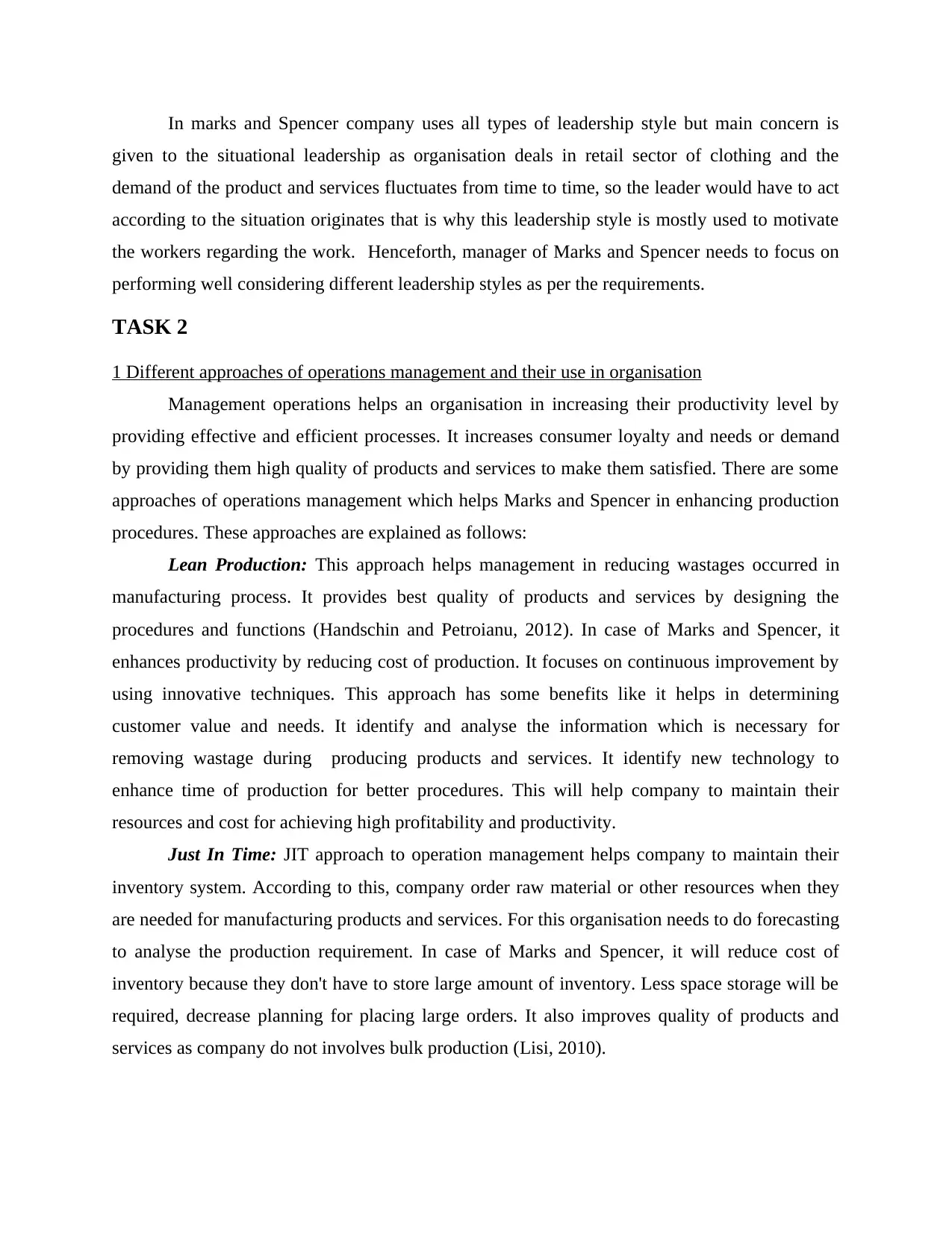
In marks and Spencer company uses all types of leadership style but main concern is
given to the situational leadership as organisation deals in retail sector of clothing and the
demand of the product and services fluctuates from time to time, so the leader would have to act
according to the situation originates that is why this leadership style is mostly used to motivate
the workers regarding the work. Henceforth, manager of Marks and Spencer needs to focus on
performing well considering different leadership styles as per the requirements.
TASK 2
1 Different approaches of operations management and their use in organisation
Management operations helps an organisation in increasing their productivity level by
providing effective and efficient processes. It increases consumer loyalty and needs or demand
by providing them high quality of products and services to make them satisfied. There are some
approaches of operations management which helps Marks and Spencer in enhancing production
procedures. These approaches are explained as follows:
Lean Production: This approach helps management in reducing wastages occurred in
manufacturing process. It provides best quality of products and services by designing the
procedures and functions (Handschin and Petroianu, 2012). In case of Marks and Spencer, it
enhances productivity by reducing cost of production. It focuses on continuous improvement by
using innovative techniques. This approach has some benefits like it helps in determining
customer value and needs. It identify and analyse the information which is necessary for
removing wastage during producing products and services. It identify new technology to
enhance time of production for better procedures. This will help company to maintain their
resources and cost for achieving high profitability and productivity.
Just In Time: JIT approach to operation management helps company to maintain their
inventory system. According to this, company order raw material or other resources when they
are needed for manufacturing products and services. For this organisation needs to do forecasting
to analyse the production requirement. In case of Marks and Spencer, it will reduce cost of
inventory because they don't have to store large amount of inventory. Less space storage will be
required, decrease planning for placing large orders. It also improves quality of products and
services as company do not involves bulk production (Lisi, 2010).
given to the situational leadership as organisation deals in retail sector of clothing and the
demand of the product and services fluctuates from time to time, so the leader would have to act
according to the situation originates that is why this leadership style is mostly used to motivate
the workers regarding the work. Henceforth, manager of Marks and Spencer needs to focus on
performing well considering different leadership styles as per the requirements.
TASK 2
1 Different approaches of operations management and their use in organisation
Management operations helps an organisation in increasing their productivity level by
providing effective and efficient processes. It increases consumer loyalty and needs or demand
by providing them high quality of products and services to make them satisfied. There are some
approaches of operations management which helps Marks and Spencer in enhancing production
procedures. These approaches are explained as follows:
Lean Production: This approach helps management in reducing wastages occurred in
manufacturing process. It provides best quality of products and services by designing the
procedures and functions (Handschin and Petroianu, 2012). In case of Marks and Spencer, it
enhances productivity by reducing cost of production. It focuses on continuous improvement by
using innovative techniques. This approach has some benefits like it helps in determining
customer value and needs. It identify and analyse the information which is necessary for
removing wastage during producing products and services. It identify new technology to
enhance time of production for better procedures. This will help company to maintain their
resources and cost for achieving high profitability and productivity.
Just In Time: JIT approach to operation management helps company to maintain their
inventory system. According to this, company order raw material or other resources when they
are needed for manufacturing products and services. For this organisation needs to do forecasting
to analyse the production requirement. In case of Marks and Spencer, it will reduce cost of
inventory because they don't have to store large amount of inventory. Less space storage will be
required, decrease planning for placing large orders. It also improves quality of products and
services as company do not involves bulk production (Lisi, 2010).
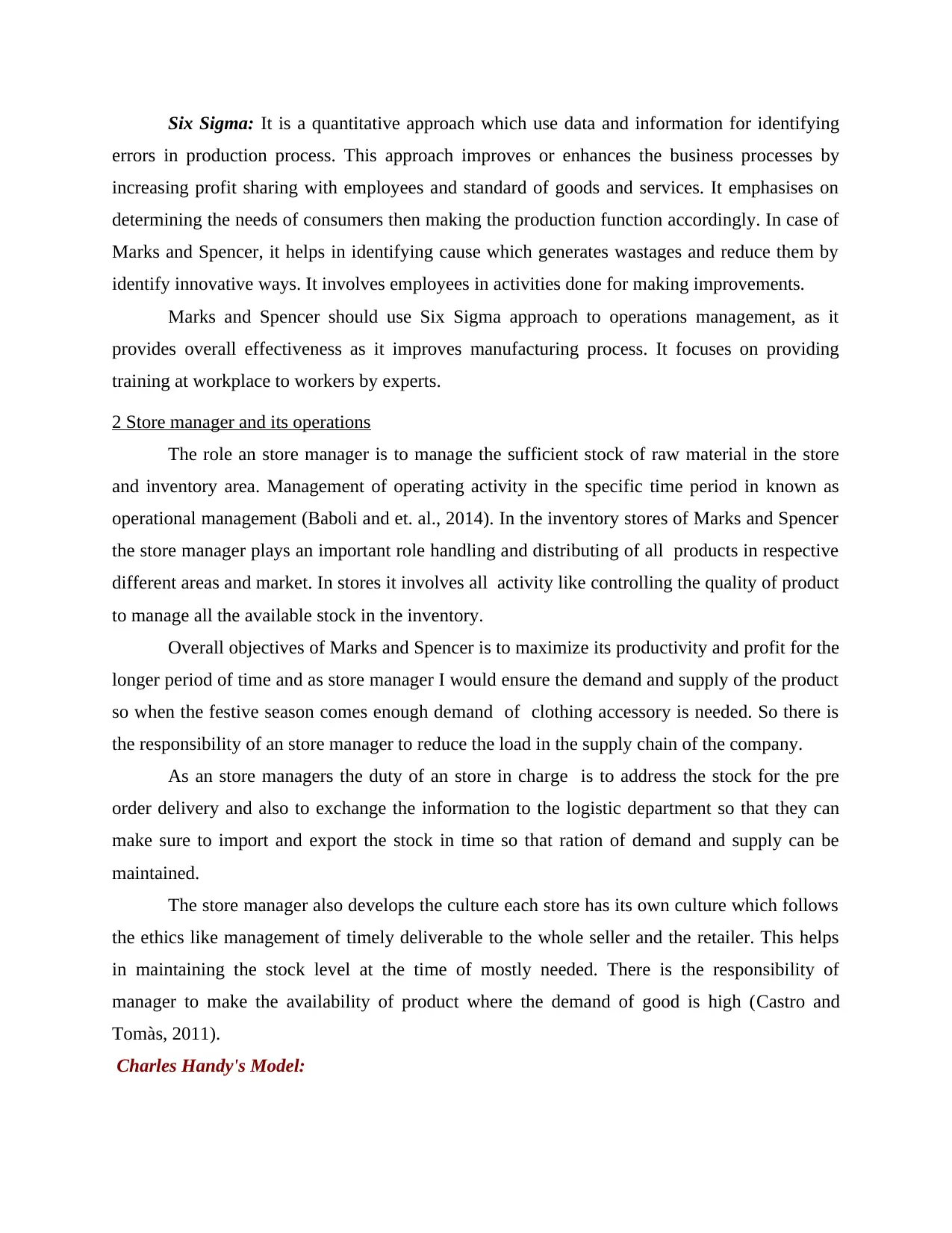
Six Sigma: It is a quantitative approach which use data and information for identifying
errors in production process. This approach improves or enhances the business processes by
increasing profit sharing with employees and standard of goods and services. It emphasises on
determining the needs of consumers then making the production function accordingly. In case of
Marks and Spencer, it helps in identifying cause which generates wastages and reduce them by
identify innovative ways. It involves employees in activities done for making improvements.
Marks and Spencer should use Six Sigma approach to operations management, as it
provides overall effectiveness as it improves manufacturing process. It focuses on providing
training at workplace to workers by experts.
2 Store manager and its operations
The role an store manager is to manage the sufficient stock of raw material in the store
and inventory area. Management of operating activity in the specific time period in known as
operational management (Baboli and et. al., 2014). In the inventory stores of Marks and Spencer
the store manager plays an important role handling and distributing of all products in respective
different areas and market. In stores it involves all activity like controlling the quality of product
to manage all the available stock in the inventory.
Overall objectives of Marks and Spencer is to maximize its productivity and profit for the
longer period of time and as store manager I would ensure the demand and supply of the product
so when the festive season comes enough demand of clothing accessory is needed. So there is
the responsibility of an store manager to reduce the load in the supply chain of the company.
As an store managers the duty of an store in charge is to address the stock for the pre
order delivery and also to exchange the information to the logistic department so that they can
make sure to import and export the stock in time so that ration of demand and supply can be
maintained.
The store manager also develops the culture each store has its own culture which follows
the ethics like management of timely deliverable to the whole seller and the retailer. This helps
in maintaining the stock level at the time of mostly needed. There is the responsibility of
manager to make the availability of product where the demand of good is high (Castro and
Tomàs, 2011).
Charles Handy's Model:
errors in production process. This approach improves or enhances the business processes by
increasing profit sharing with employees and standard of goods and services. It emphasises on
determining the needs of consumers then making the production function accordingly. In case of
Marks and Spencer, it helps in identifying cause which generates wastages and reduce them by
identify innovative ways. It involves employees in activities done for making improvements.
Marks and Spencer should use Six Sigma approach to operations management, as it
provides overall effectiveness as it improves manufacturing process. It focuses on providing
training at workplace to workers by experts.
2 Store manager and its operations
The role an store manager is to manage the sufficient stock of raw material in the store
and inventory area. Management of operating activity in the specific time period in known as
operational management (Baboli and et. al., 2014). In the inventory stores of Marks and Spencer
the store manager plays an important role handling and distributing of all products in respective
different areas and market. In stores it involves all activity like controlling the quality of product
to manage all the available stock in the inventory.
Overall objectives of Marks and Spencer is to maximize its productivity and profit for the
longer period of time and as store manager I would ensure the demand and supply of the product
so when the festive season comes enough demand of clothing accessory is needed. So there is
the responsibility of an store manager to reduce the load in the supply chain of the company.
As an store managers the duty of an store in charge is to address the stock for the pre
order delivery and also to exchange the information to the logistic department so that they can
make sure to import and export the stock in time so that ration of demand and supply can be
maintained.
The store manager also develops the culture each store has its own culture which follows
the ethics like management of timely deliverable to the whole seller and the retailer. This helps
in maintaining the stock level at the time of mostly needed. There is the responsibility of
manager to make the availability of product where the demand of good is high (Castro and
Tomàs, 2011).
Charles Handy's Model:
⊘ This is a preview!⊘
Do you want full access?
Subscribe today to unlock all pages.

Trusted by 1+ million students worldwide
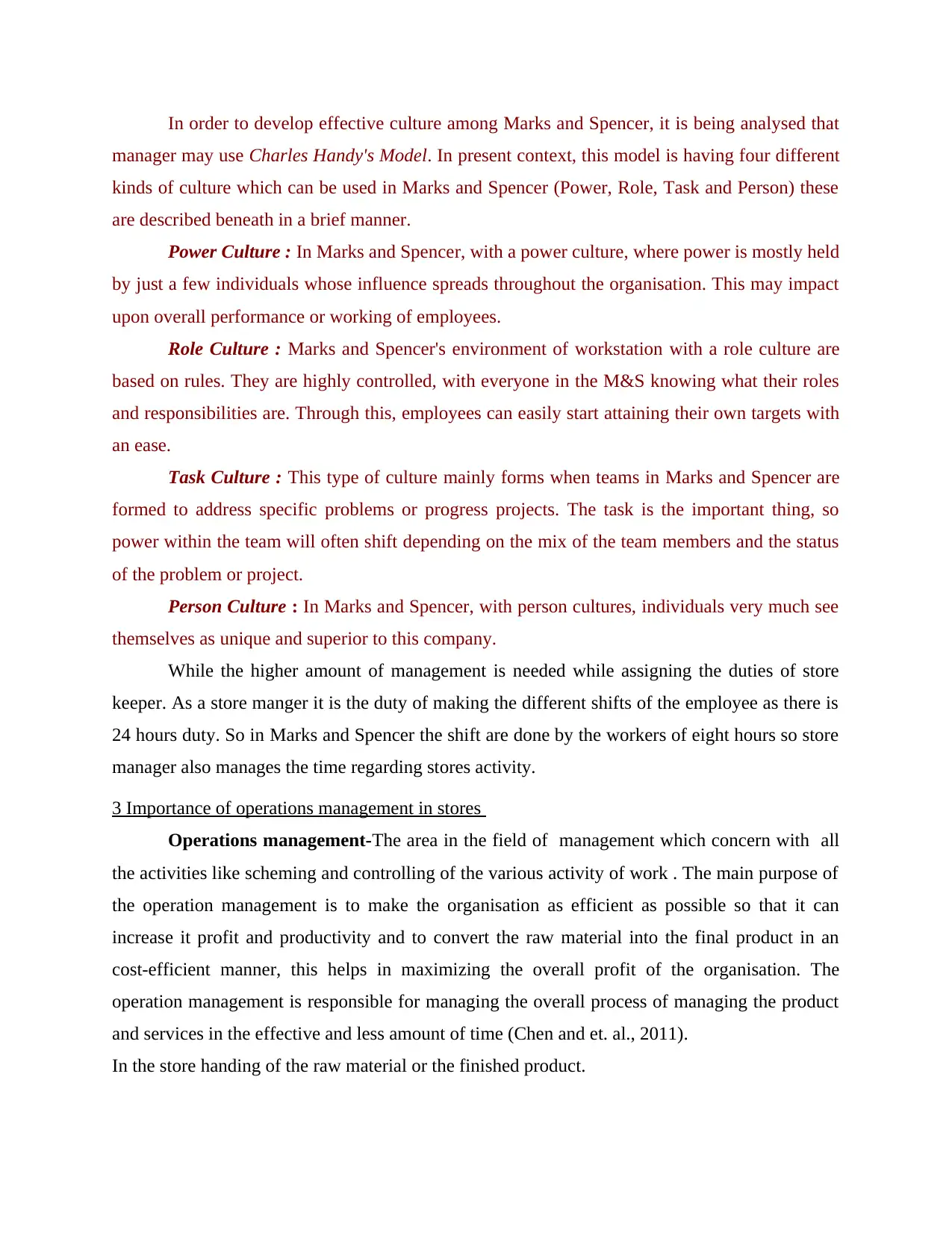
In order to develop effective culture among Marks and Spencer, it is being analysed that
manager may use Charles Handy's Model. In present context, this model is having four different
kinds of culture which can be used in Marks and Spencer (Power, Role, Task and Person) these
are described beneath in a brief manner.
Power Culture : In Marks and Spencer, with a power culture, where power is mostly held
by just a few individuals whose influence spreads throughout the organisation. This may impact
upon overall performance or working of employees.
Role Culture : Marks and Spencer's environment of workstation with a role culture are
based on rules. They are highly controlled, with everyone in the M&S knowing what their roles
and responsibilities are. Through this, employees can easily start attaining their own targets with
an ease.
Task Culture : This type of culture mainly forms when teams in Marks and Spencer are
formed to address specific problems or progress projects. The task is the important thing, so
power within the team will often shift depending on the mix of the team members and the status
of the problem or project.
Person Culture : In Marks and Spencer, with person cultures, individuals very much see
themselves as unique and superior to this company.
While the higher amount of management is needed while assigning the duties of store
keeper. As a store manger it is the duty of making the different shifts of the employee as there is
24 hours duty. So in Marks and Spencer the shift are done by the workers of eight hours so store
manager also manages the time regarding stores activity.
3 Importance of operations management in stores
Operations management-The area in the field of management which concern with all
the activities like scheming and controlling of the various activity of work . The main purpose of
the operation management is to make the organisation as efficient as possible so that it can
increase it profit and productivity and to convert the raw material into the final product in an
cost-efficient manner, this helps in maximizing the overall profit of the organisation. The
operation management is responsible for managing the overall process of managing the product
and services in the effective and less amount of time (Chen and et. al., 2011).
In the store handing of the raw material or the finished product.
manager may use Charles Handy's Model. In present context, this model is having four different
kinds of culture which can be used in Marks and Spencer (Power, Role, Task and Person) these
are described beneath in a brief manner.
Power Culture : In Marks and Spencer, with a power culture, where power is mostly held
by just a few individuals whose influence spreads throughout the organisation. This may impact
upon overall performance or working of employees.
Role Culture : Marks and Spencer's environment of workstation with a role culture are
based on rules. They are highly controlled, with everyone in the M&S knowing what their roles
and responsibilities are. Through this, employees can easily start attaining their own targets with
an ease.
Task Culture : This type of culture mainly forms when teams in Marks and Spencer are
formed to address specific problems or progress projects. The task is the important thing, so
power within the team will often shift depending on the mix of the team members and the status
of the problem or project.
Person Culture : In Marks and Spencer, with person cultures, individuals very much see
themselves as unique and superior to this company.
While the higher amount of management is needed while assigning the duties of store
keeper. As a store manger it is the duty of making the different shifts of the employee as there is
24 hours duty. So in Marks and Spencer the shift are done by the workers of eight hours so store
manager also manages the time regarding stores activity.
3 Importance of operations management in stores
Operations management-The area in the field of management which concern with all
the activities like scheming and controlling of the various activity of work . The main purpose of
the operation management is to make the organisation as efficient as possible so that it can
increase it profit and productivity and to convert the raw material into the final product in an
cost-efficient manner, this helps in maximizing the overall profit of the organisation. The
operation management is responsible for managing the overall process of managing the product
and services in the effective and less amount of time (Chen and et. al., 2011).
In the store handing of the raw material or the finished product.
Paraphrase This Document
Need a fresh take? Get an instant paraphrase of this document with our AI Paraphraser
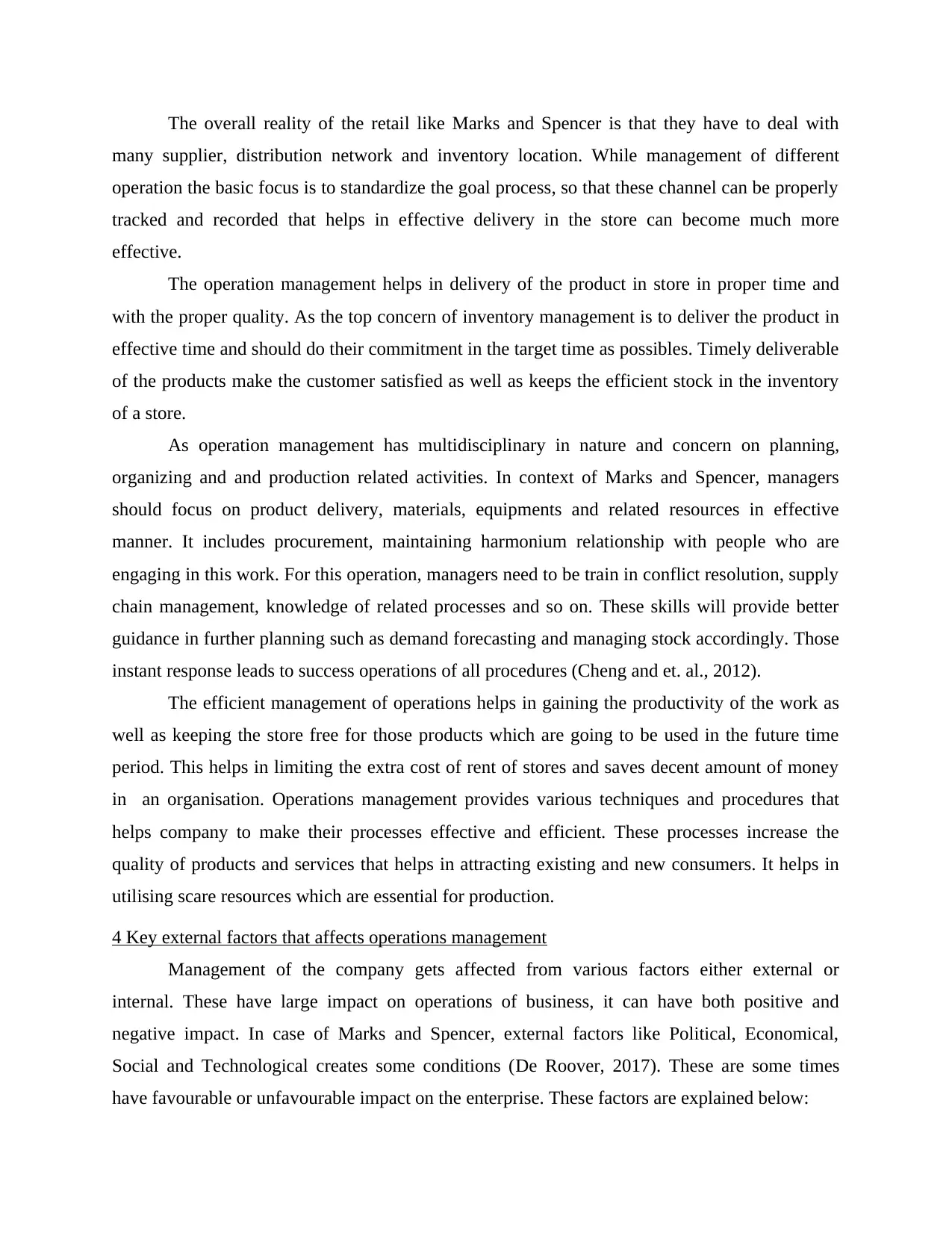
The overall reality of the retail like Marks and Spencer is that they have to deal with
many supplier, distribution network and inventory location. While management of different
operation the basic focus is to standardize the goal process, so that these channel can be properly
tracked and recorded that helps in effective delivery in the store can become much more
effective.
The operation management helps in delivery of the product in store in proper time and
with the proper quality. As the top concern of inventory management is to deliver the product in
effective time and should do their commitment in the target time as possibles. Timely deliverable
of the products make the customer satisfied as well as keeps the efficient stock in the inventory
of a store.
As operation management has multidisciplinary in nature and concern on planning,
organizing and and production related activities. In context of Marks and Spencer, managers
should focus on product delivery, materials, equipments and related resources in effective
manner. It includes procurement, maintaining harmonium relationship with people who are
engaging in this work. For this operation, managers need to be train in conflict resolution, supply
chain management, knowledge of related processes and so on. These skills will provide better
guidance in further planning such as demand forecasting and managing stock accordingly. Those
instant response leads to success operations of all procedures (Cheng and et. al., 2012).
The efficient management of operations helps in gaining the productivity of the work as
well as keeping the store free for those products which are going to be used in the future time
period. This helps in limiting the extra cost of rent of stores and saves decent amount of money
in an organisation. Operations management provides various techniques and procedures that
helps company to make their processes effective and efficient. These processes increase the
quality of products and services that helps in attracting existing and new consumers. It helps in
utilising scare resources which are essential for production.
4 Key external factors that affects operations management
Management of the company gets affected from various factors either external or
internal. These have large impact on operations of business, it can have both positive and
negative impact. In case of Marks and Spencer, external factors like Political, Economical,
Social and Technological creates some conditions (De Roover, 2017). These are some times
have favourable or unfavourable impact on the enterprise. These factors are explained below:
many supplier, distribution network and inventory location. While management of different
operation the basic focus is to standardize the goal process, so that these channel can be properly
tracked and recorded that helps in effective delivery in the store can become much more
effective.
The operation management helps in delivery of the product in store in proper time and
with the proper quality. As the top concern of inventory management is to deliver the product in
effective time and should do their commitment in the target time as possibles. Timely deliverable
of the products make the customer satisfied as well as keeps the efficient stock in the inventory
of a store.
As operation management has multidisciplinary in nature and concern on planning,
organizing and and production related activities. In context of Marks and Spencer, managers
should focus on product delivery, materials, equipments and related resources in effective
manner. It includes procurement, maintaining harmonium relationship with people who are
engaging in this work. For this operation, managers need to be train in conflict resolution, supply
chain management, knowledge of related processes and so on. These skills will provide better
guidance in further planning such as demand forecasting and managing stock accordingly. Those
instant response leads to success operations of all procedures (Cheng and et. al., 2012).
The efficient management of operations helps in gaining the productivity of the work as
well as keeping the store free for those products which are going to be used in the future time
period. This helps in limiting the extra cost of rent of stores and saves decent amount of money
in an organisation. Operations management provides various techniques and procedures that
helps company to make their processes effective and efficient. These processes increase the
quality of products and services that helps in attracting existing and new consumers. It helps in
utilising scare resources which are essential for production.
4 Key external factors that affects operations management
Management of the company gets affected from various factors either external or
internal. These have large impact on operations of business, it can have both positive and
negative impact. In case of Marks and Spencer, external factors like Political, Economical,
Social and Technological creates some conditions (De Roover, 2017). These are some times
have favourable or unfavourable impact on the enterprise. These factors are explained below:
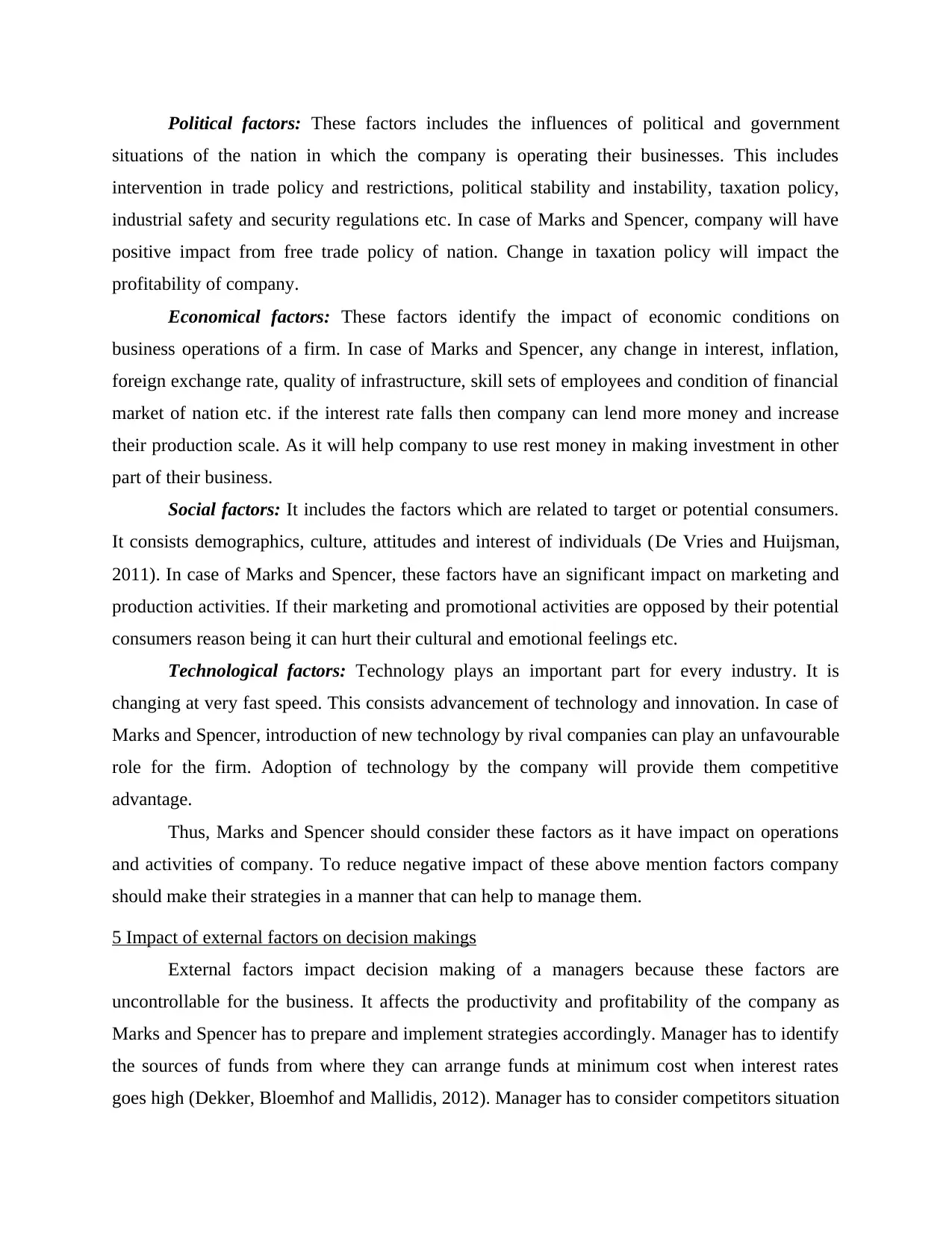
Political factors: These factors includes the influences of political and government
situations of the nation in which the company is operating their businesses. This includes
intervention in trade policy and restrictions, political stability and instability, taxation policy,
industrial safety and security regulations etc. In case of Marks and Spencer, company will have
positive impact from free trade policy of nation. Change in taxation policy will impact the
profitability of company.
Economical factors: These factors identify the impact of economic conditions on
business operations of a firm. In case of Marks and Spencer, any change in interest, inflation,
foreign exchange rate, quality of infrastructure, skill sets of employees and condition of financial
market of nation etc. if the interest rate falls then company can lend more money and increase
their production scale. As it will help company to use rest money in making investment in other
part of their business.
Social factors: It includes the factors which are related to target or potential consumers.
It consists demographics, culture, attitudes and interest of individuals (De Vries and Huijsman,
2011). In case of Marks and Spencer, these factors have an significant impact on marketing and
production activities. If their marketing and promotional activities are opposed by their potential
consumers reason being it can hurt their cultural and emotional feelings etc.
Technological factors: Technology plays an important part for every industry. It is
changing at very fast speed. This consists advancement of technology and innovation. In case of
Marks and Spencer, introduction of new technology by rival companies can play an unfavourable
role for the firm. Adoption of technology by the company will provide them competitive
advantage.
Thus, Marks and Spencer should consider these factors as it have impact on operations
and activities of company. To reduce negative impact of these above mention factors company
should make their strategies in a manner that can help to manage them.
5 Impact of external factors on decision makings
External factors impact decision making of a managers because these factors are
uncontrollable for the business. It affects the productivity and profitability of the company as
Marks and Spencer has to prepare and implement strategies accordingly. Manager has to identify
the sources of funds from where they can arrange funds at minimum cost when interest rates
goes high (Dekker, Bloemhof and Mallidis, 2012). Manager has to consider competitors situation
situations of the nation in which the company is operating their businesses. This includes
intervention in trade policy and restrictions, political stability and instability, taxation policy,
industrial safety and security regulations etc. In case of Marks and Spencer, company will have
positive impact from free trade policy of nation. Change in taxation policy will impact the
profitability of company.
Economical factors: These factors identify the impact of economic conditions on
business operations of a firm. In case of Marks and Spencer, any change in interest, inflation,
foreign exchange rate, quality of infrastructure, skill sets of employees and condition of financial
market of nation etc. if the interest rate falls then company can lend more money and increase
their production scale. As it will help company to use rest money in making investment in other
part of their business.
Social factors: It includes the factors which are related to target or potential consumers.
It consists demographics, culture, attitudes and interest of individuals (De Vries and Huijsman,
2011). In case of Marks and Spencer, these factors have an significant impact on marketing and
production activities. If their marketing and promotional activities are opposed by their potential
consumers reason being it can hurt their cultural and emotional feelings etc.
Technological factors: Technology plays an important part for every industry. It is
changing at very fast speed. This consists advancement of technology and innovation. In case of
Marks and Spencer, introduction of new technology by rival companies can play an unfavourable
role for the firm. Adoption of technology by the company will provide them competitive
advantage.
Thus, Marks and Spencer should consider these factors as it have impact on operations
and activities of company. To reduce negative impact of these above mention factors company
should make their strategies in a manner that can help to manage them.
5 Impact of external factors on decision makings
External factors impact decision making of a managers because these factors are
uncontrollable for the business. It affects the productivity and profitability of the company as
Marks and Spencer has to prepare and implement strategies accordingly. Manager has to identify
the sources of funds from where they can arrange funds at minimum cost when interest rates
goes high (Dekker, Bloemhof and Mallidis, 2012). Manager has to consider competitors situation
⊘ This is a preview!⊘
Do you want full access?
Subscribe today to unlock all pages.

Trusted by 1+ million students worldwide
1 out of 14
Related Documents
Your All-in-One AI-Powered Toolkit for Academic Success.
+13062052269
info@desklib.com
Available 24*7 on WhatsApp / Email
![[object Object]](/_next/static/media/star-bottom.7253800d.svg)
Unlock your academic potential
Copyright © 2020–2026 A2Z Services. All Rights Reserved. Developed and managed by ZUCOL.





